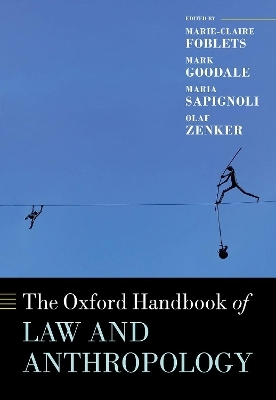
The Oxford Handbook of Law and Anthropology
Oxford University Press (Verlag)
978-0-19-884053-4 (ISBN)
The Oxford Handbook of Law and Anthropology is a ground-breaking collection of essays that provides an original and internationally framed conception of the historical, theoretical, and ethnographic interconnections of law and anthropology. Each of the chapters in the Handbook provides a survey of the current state of scholarly debate and an argument about the future direction of research in this dynamic and interdisciplinary field. The structure of the Handbook is animated by an overarching collective narrative about how law and anthropology have and should relate to each other as intersecting domains of inquiry that address such fundamental questions as dispute resolution, normative ordering, social organization, and legal, political, and social identity.
The need for such a comprehensive project has become even more pressing as lawyers and anthropologists work together in an ever-increasing number of areas, including immigration and asylum processes, international justice forums, cultural heritage certification and monitoring, and the writing of new national constitutions, among many others. The Handbook takes critical stock of these various points of intersection in order to identify and conceptualize the most promising areas of innovation and sociolegal relevance, as well as to acknowledge the points of tension, open questions, and areas for future development.
Marie-Claire Foblets is Director of the Law & Anthropology Department at the Max Planck Institute for Social Anthropology and Honorary Professor of Law & Anthropology at the Martin Luther University Halle-Wittenberg, both in Halle/Saale, Germany. Trained in law and anthropology, she taught law as well as social and cultural anthropology at the universities of Antwerp and Brussels and the Catholic University of Leuven, where she headed the Institute for Migration Law and Legal Anthropology, before joining the Max Planck Institute. She has also been a member of various networks of researchers focusing either on the study of the application of Islamic law in Europe or on law and migration in Europe, paying particular attention to family law. Her numerous publications include Family, Religion and Law: Cultural Encounters in Europe (Ashgate, 2014). Mark Goodale is Professor of Cultural and Social Anthropology at the University of Lausanne and Series Editor of Stanford Studies in Human Rights. He studies the intersections of culture, rights, ethics, and justice and is the author or editor of many volumes, including Anthropology and Law: A Critical Introduction (NYU Press, 2017), Human Rights at the Crossroads (ed., Oxford UP, 2013), Human Rights: An Anthropological Reader (ed., Blackwell, 2010), Surrendering to Utopia: An Anthropology of Human Rights (Stanford UP, 2009), and The Practice of Human Rights: Tracking Law Between the Global and the Local (coed. with Sally Engle Merry, Cambridge UP, 2007). He is currently writing a new book on justice, ideology, and practice in Bolivia based on nine years of ethnographic research. Maria Sapignoli is an Assistant Professor of Cultural and Social Anthropology at the University of Milan and cooperation partner in the Law & Anthropology Department at the Max Planck Institute for Social Anthropology. Sapignoli has spent the past ten years conducing ethnographic fieldwork in southern Africa as well as in several international organizations, including the United Nations, on topics of institutional reform, indigenous and minorities rights, social movements and advocacy and, ultimately, justice. Most recently she has started a new project that engages, critically and collaboratively, with the legal and social challenges and opportunities presented by the use of AI technologies and big data in society and in environmental governance. She is the author of Hunting Justice: Displacement, Law, and Activism in the Kalahari (Cambridge University Press 2018), as well as numerous articles and book chapters. Olaf Zenker is Professor of Social Anthropology at Martin Luther University Halle-Wittenberg, Germany. Focusing on Southern Africa, Northern Ireland and Germany, his research has dealt with politico-legal issues such as conflict and identity formations, plural normative orders, statehood, bureaucracy and the rules of law. His publications include The State and the Paradox of Customary Law in Africa (coed. with Markus Hoehne, Routledge, 2018), South African Homelands as Frontiers: Apartheid's Loose Ends in the Postcolonial Era (coed. with Steffen Jensen, Routledge, 2016) and Transition and Justice: Negotiating the Terms of New Beginnings in Africa (coed. With Gerhard Anders, Wiley-Blackwell, 2015). He is currently working on a book on land restitution and the moral modernity of the new South African state.
Global perspectives on law & anthropology
1: Carol Greenhouse: Social Control through Law: Critical afterlives
2: Martin Chanock: Anthropology, Law, and Empire: Foundations in context
3: Sindiso Mnisi Weeks: South African Legal Culture and its Dis/empowerment Paradox
4: Pratiksha Baxi: The Ethnographic Gaze on State Law in India
5: Paul Burke: The Anthropology of Indigenous Australia and Native Title Claims
6: Brian Thom: Encountering Indigenous Law in Canada
7: Florian Stammler, Aytalina Ivanova, and Brian Donahoe: Russian Legal Anthropology: From empirical ethnography to applied innovation
8: Armando Guevara Gil: Indigenous Peoples, Identity, and Free, Prior, and Informed Consultation in Latin America
9: Do Dom Kim: Rule of Law and Media in the Making of Legal Identity in Urban Southern China
10: Dominik Müller: Islam, Law, and the State
11: Keebet von Benda-Beckmann: Law and Anthropology in the Netherlands: From Adat Law School to Anthropology of Law
12: Frédéric Audren and Laetitia Guerlain: Legal Uses of Anthropology in France in the 19th and 20th centuries
13: Balacz Fekete: Legal Ethnology and Legal Anthropology in Hungary
14: Michele Graziadei: The Anthropology of European Law
Recurring themes in law and anthropology
15: Elizabeth Mertz: Within and Beyond the Anthropology of Language and Law
16: Anne Griffiths: Law as an Enduring Concept: Space, time, and power
17: Fernanda Pirie: Legalism: Rules, categories, and texts
18: Günter Frankenberg: Legal Transfer
19: Thomas Duve: Legal Traditions
20: Baudouin Dupret: The Concept of Positive Law and its Relationship to Religion and Morality
21: Matthew Canfield: Property Regimes
22: Markus Böckenförde, Berihun Gebeye: Law and Development
23: Mark Goodale: Rights and Social Inclusion
24: Lynette Chua: Human Rights Activism, Sexuality, and Gender
Anthropology in law and legal practice
25: Alison Dundes Renteln: The Cultural Defence
26: Andrzej Jakubowski: Cultural Rights and Cultural Heritage as a Global Concern
27: Faris Nasrallah: Alternative Dispute Resolution
28: Richard A. Wilson: Justice after Atrocity
29: Marie-Claire Foblets: Kinship through the Twofold Prism of Law and Anthropology
30: Dirk Hanschel, Elizabeth Steyn: Environmental Justice
Anthropology at the limits of law
31: Felix-Anselm van Lier, Katrin Seidel: Constitution Making
32: Jennifer Burrell: Vigilantism and Security-making
33: Math Noortmann, Juliette Koning: The Normative Complexity of Private Security: Beyond legal regulation and stigmatization
34: Erica Bornstein: Humanitarian Interventions
35: Rita Kesselring: Inequality, Victimhood, and Redress
36: Katayoun Alidadi: Anti-discrimination Rules and Religious Minorities in the Workplace
37: Priscilla Claeys, Karine Peschard: Transnational Agrarian Movements, Food Sovereignty, and Legal Mobilization
38: Rachel Sieder: The Juridification of Politics
39: Meg Davis: The Persistence of Chinese Rights Defenders
Current directions in law & anthropology
40: Sally Engle Merry: The Problem of Compliance and the Turn to Quantification
41: Bert Turner, Melanie Wiber: Law, Science, and Technologies
42: Olaf Zenker: Politics of Belonging
43: Katia Bianchini: Legal and Anthropological Approaches to International Refugee Law
44: Philipp Dann, Julia Eckert: Norm Creation Beyond the State
45: Didier Fassin: Critique of Punitive Reason
46: Maria Sapignoli, Ronald Niezen: Global Legal Institutions
47: Annelise Riles, Ralf Michaels: Law as Technique
48: Kamari Clarke: Emotion, Affect, and Law
49: Eve Darian-Smith: Legal Pluralism in Postcolonial, Postnational, and Postdemocratic Contexts
| Erscheinungsdatum | 07.04.2022 |
|---|---|
| Reihe/Serie | Oxford Handbooks |
| Verlagsort | Oxford |
| Sprache | englisch |
| Maße | 180 x 255 mm |
| Gewicht | 1834 g |
| Themenwelt | Recht / Steuern ► Allgemeines / Lexika |
| Recht / Steuern ► EU / Internationales Recht | |
| Sozialwissenschaften ► Ethnologie | |
| Sozialwissenschaften ► Soziologie | |
| ISBN-10 | 0-19-884053-5 / 0198840535 |
| ISBN-13 | 978-0-19-884053-4 / 9780198840534 |
| Zustand | Neuware |
| Informationen gemäß Produktsicherheitsverordnung (GPSR) | |
| Haben Sie eine Frage zum Produkt? |
aus dem Bereich


